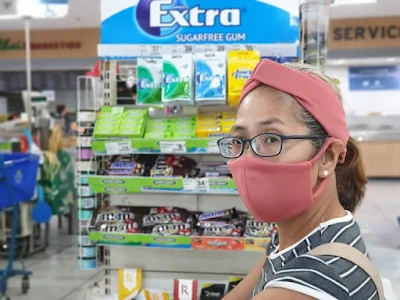Maskne: The New Skin Condition to Watch Out
Wearing a face mask together with the face shield has become the new norm. It is required to be worn at all times in public places as a barrier to slow down the spread of the Covid-19 virus that spreads through respiratory droplets. However, constantly wearing a mask can develop skin issues and breakouts, and this condition is known as Maskne or mask acne.
Maskne is a
common side effect of using a face mask. According to Healthline, it
doesn’t simply cause pimples, it may result to other skin issues like
irritation, bumpiness and redness.
Skin conditions caused by wearing face mask
Acne. Sweat, make up, oil, dead skin cells can clog pores which can cause blackheads or whiteheads and pimples.
Rosacea. Wearing
a face mask can flare-up rosacea - the skin
condition that produce small, red, pus-filled bumps and causes redness and
visible blood vessels in your face.
Contact
dermatitis. Not all face mask may suit your skin. If you have a sensitive skin,
the material of your mask may cause an allergic reaction which may result to
blisters and red rash.
Folliculitis. Very
tight wearing of the mask can result to Folliculitis. It is a skin condition in
which hair follicles become inflamed.
Causes of Maskne
Clogged pores.
Dead skin cells and oil can build up more when you wear a mask and block your pores.
Sweating and
breathing. Due to sweating and breathing, the mask traps humidity which may
increase the risk of skin break out
Friction. The
material of the mask you’re wearing can rub against your skin which may
eventually lead to irritation.
Allergic
reaction. Skin sensitivity to the material of your mask may cause allergic
reaction. Masks washed in scented laundry detergents may also cause irritation
to sensitive skin.
Prevention
Cotton made
mask. We sweat more as the temperature rises, and we need to keep our mask
clean at the same time. Most dermatologists suggest using a 100 percent cotton
mask as it allows the skin to breathe a bit.
Skin care. Be
wary of your skin care routine. Use a gentle facial cleanser and a non-comedogenic
moisturizer which likely will not block your pores but will keep your skin hydrated.
No to makeup.
Temporarily break up with make up when you go out.
Choosing and wearing
the right mask
To avoid skin
irritation and skin conditions mentioned above, be aware of the type of mask
that you buy and wear.
Choose a mask
that is made of soft and natural fabric like cotton. Choose the ones that has
two or more layers of fabric for more protection.
Your mask must
fit tight but not too tight.
Nylon and rayon
are synthetic fabrics, so if you have sensitive skin, you must not wear masks
made of these materials.
To help give
skin a break, the American
Academy of Dermatology Association recommends removing your mask for 15
minutes every 4 hours. However, be mindful, wash or sanitize or hands first and
more importantly make sure you are far from the people around you or there are
no people around you before taking a mask break. Moreover, use micellar water
or a gentle cleanser to do a quick wash when you take it off.




Comments
Post a Comment